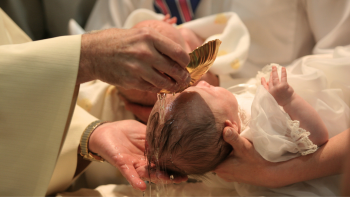Hope is a gift from God which fosters within us a deep and appropriate desire for Him. Some of our greatest gifts of hope – during this Jubilee Year of Hope and always – are the seven Sacraments.
We experience the Sacraments one at a time, so we probably don’t often think of them as a group. Recently, Bishop Alfred Schlert provided some context to help us think about all seven Sacraments in relation to one another:
"Jesus gives us, at every moment of our lives, what we need, especially through the seven Sacraments,” he said. “We're always in need of His love and His nourishment, so we have the Holy Eucharist. We're always in need of forgiveness so we have the Sacrament of Penance. We're always in need of healing, so we have the Sacrament of the Anointing of the Sick.
“Other Sacraments like Confirmation give us the strength for a lifetime,” the bishop said. “The Sacrament of Marriage gives us the strength for a lifetime. The Sacrament of Holy Orders, through which we have the Priesthood, provides strength for a lifetime. Baptism brings us into the Church. It washes away our original sin for a lifetime."
The Seven Sacraments can be divided into three broad categories:
The Sacraments of Initiation (Baptism, Confirmation, and the Holy Eucharist), the Sacraments of Healing (Penance and Anointing of the Sick), and the Sacraments at the Service of Communion (Marriage and Holy Orders).
Here is a quick overview of these Sacraments, along with some excerpts on each of them from the Catechism of the Catholic Church (in italics.)
Baptism – Instituted by Christ when He was baptized by Saint John the Baptist, removes original sin. It is the basis of the whole Christian life, the gateway to life in the Spirit, and the door which gives access to the other Sacraments.
Confirmation – When Christ conferred the Holy Spirit on His apostles on Easter, and then again on Pentecost, He instituted the Sacrament of Confirmation, by which we are more perfectly bound to the Church and are enriched with a special strength of the Holy Spirit.
The Holy Eucharist – At the Last Supper, as Jesus shared a final meal with His disciples, He instituted the Holy Eucharist. It is the Sacrament that is most central to the Catholic faith and the source and summit of the Christian life. When a priest celebrates Mass, he consecrates the bread and wine, and by the power of the Holy Spirit, they become the Body, Blood, Soul, and Divinity of Jesus Christ.
Penance – Also known as Reconciliation or Confession, this Sacrament was instituted by Christ on Easter Sunday evening, when He told His Apostles, “Receive the Holy Spirit. Whose sins you forgive are forgiven them, and whose sins you retain are retained.” It is through the Sacrament of Penance that the baptized can be reconciled with God and with the Church.
Anointing of the Sick – Not only associated with the dying, this Sacrament can benefit anyone in need of healing, whether it be physical healing, emotional healing, or spiritual healing. “By the sacred anointing of the sick and the prayer of the priests, the whole Church commends those who are ill to the suffering and glorified Lord, that He may raise them up and save them.
Holy Orders – Instituted by Christ at the Last Supper, this is the Sacrament men receive when they become deacons, priests, and bishops. Holy Orders is the Sacrament through which the mission entrusted by Christ to His apostles continues to be exercised in the Church until the end of time.
Matrimony – Christ initiated the Sacrament of Matrimony when He attended the wedding feast of Cana and preached that the union of a man and woman should be permanent until death. The Sacrament of Matrimony signifies the union of Christ and the Church. It gives spouses the grace to love each other with the love with which Christ has loved His Church; the grace of the Sacrament thus perfects the human love of the spouses, strengthens their indissoluble unity, and sanctifies them on the way to eternal life.
This Jubilee Year of Hope, declared by Pope Francis, continues through January 6, 2026. It’s an excellent time to experience God’s mercy through the Sacraments, particularly Penance and the Holy Eucharist, and to pray for anyone receiving any of the seven Sacraments.
For more about the Sacraments, visit the Sacraments web page of the United States Conference of Catholic Bishops here.
By Paul Wirth








